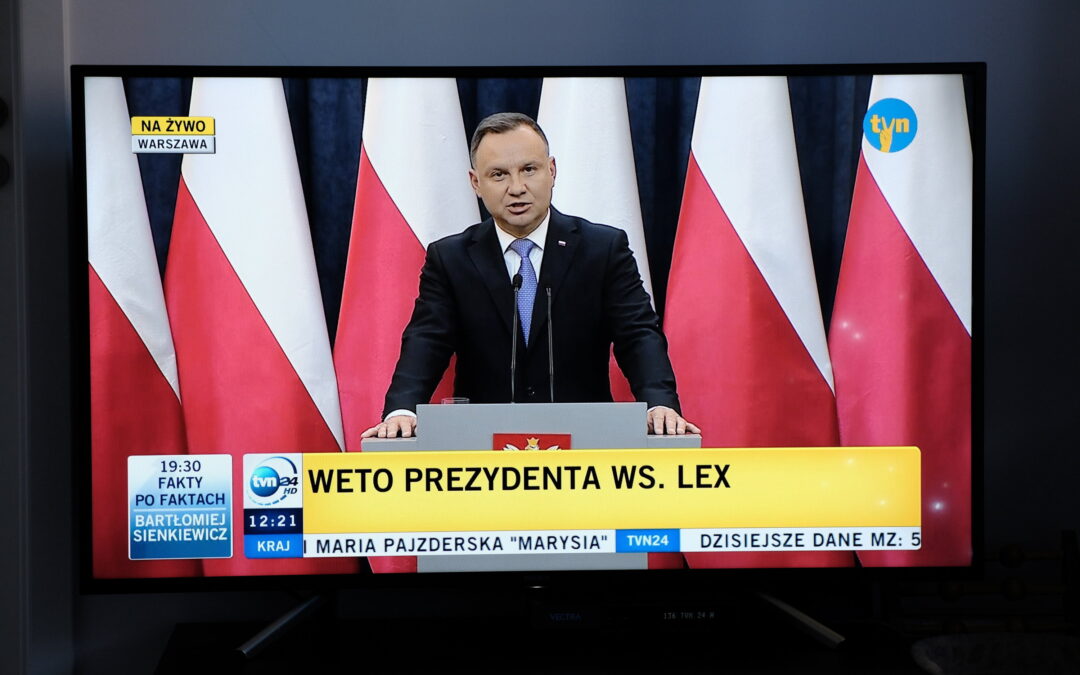President Andrzej Duda has issued a rare veto to block a law that would have restricted foreign ownership of Polish media. The legislation was seen to be aimed in particular at US-owned broadcaster TVN, which is often critical of the government.
Explaining his decision, Duda – who is normally an ally of the governing national-conservative coalition – explained that he had taken into account a Polish-American investment treaty as well as the issue of “media pluralism and freedom of speech”.
Prezydent @AndrzejDuda zawetował ustawę o radiofonii i telewizji.
Więcej: https://t.co/AsS1hPCXv7 pic.twitter.com/I4PrkzKrvh
— Kancelaria Prezydenta (@prezydentpl) December 27, 2021
“I share the opinion of the majority of my compatriots, who think that we do not need further disputes at this moment,” said the president, speaking in a televised address that was announced only this morning.
“We [already] have a lot of problems. We have a pandemic, we have inflation,” he noted. “Taking into account these circumstances, the decision was made. I refuse to sign the legislation.”
The bill now goes back to the lower house of parliament, the Sejm, which passed it ten days ago. A presidential veto can be overturned by three fifths of MPs. But the ruling coalition, which has only a narrow majority, would find that impossible to muster given that most opposition parties do not support the measures.
News of the veto was immediately welcomed by a legal representative of TVN Grupa Discovery, the group that manages TVN, Poland’s largest private broadcaster. It is owned by American conglomerate Discovery, Inc.
“We are pleased,” said Mikołaj Sowiński, quoted by Onet. “This law would have been unconstitutional and would violate international obligations.”
The rapid and unexpected passage of the legislation through the Sejm earlier this month had drawn expressions of concern from the US State Department and embassy in Warsaw, which had called on Duda to veto it.
“One of the arguments I considered was the issue of an international agreement on mutual economic and trade relations with the USA,” said Duda today, referring to a 1990 bilateral investment treaty.
“If we have made an agreement, we must keep to it…[so that] we can say that we are an honourable nation,” added the president. “I want Poland to be perceived in this way by its allies.”
“The legislation also violates presidential prerogatives,” he noted, referring to part of the bill that changes the manner of choosing the leadership of public television.
Duda added, however, that he supports the idea of restricting foreign ownership of Polish media, and noted that many “democratic countries limit foreign influence” in this way. He appealed to the Sejm to find a way to do this “in an orderly manner, without legislative ploys”.
Duda’s veto was welcomed by opposition figures. It was a “pleasant surprise”, wrote Robert Biedroń, one of the leaders of The Left (Lewica). “Pressure makes sense,” said Donald Tusk, leader of Civic Platform (PO), referring to mass protests against the media law.
However, Janusz Kowalski, an MP from the ruling United Right (Zjednoczona Prawica) coalition, expressed regret at the president’s decision. “It hurts Polish hearts. A lot,” he tweeted.
“In 2015 [before coming to power] we promised Poles reform of the judiciary and repolonisation of the media,” wrote Kowalski. “In 2017, a presidential veto stopped reform of the judiciary and today another has stopped the regulation of transparency in ownership of media in Poland.”
W 2015 r. obiecaliśmy Polakom reformę sądownictwa i repolonizację mediów. W 2017 r. prezydenckie weta zatrzymały reformę sądownictwa, a dziś kolejne prezydenckie weto zatrzymało uporządkowanie transparentności właścicielskiej mediów w Polsce.
To boli 🇵🇱serca. Bardzo.
— Janusz Kowalski 🇵🇱 (@JKowalski_posel) December 27, 2021
Main image credit: Slawomir Kaminski / Agencja Wyborcza.pl

Daniel Tilles is editor-in-chief of Notes from Poland. He has written on Polish affairs for a wide range of publications, including Foreign Policy, POLITICO Europe, EUobserver and Dziennik Gazeta Prawna.




















